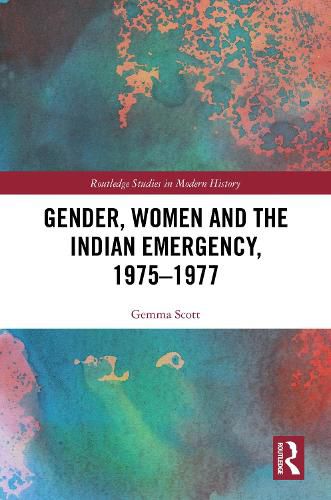Readings Newsletter
Become a Readings Member to make your shopping experience even easier.
Sign in or sign up for free!
You’re not far away from qualifying for FREE standard shipping within Australia
You’ve qualified for FREE standard shipping within Australia
The cart is loading…






India's State of Emergency (1975-1977) is one of the most controversial moments in the country's history since independence. During this infamous 21-month period, Indira Gandhi's government suspended constitutional rights, postponed elections, censored the press and arrested opposition, as well as instituting aggressive slum clearance and coercive sterilisation campaigns. Over the last 20 years, this period has received increasing scholarly attention. But the role that women played in shaping Emergency politics, their experiences of its repressive measures, and their roles in resisting them have not been considered in this scholarship.
Gender, Women and the Indian Emergency, 1975-1977 addresses this gap, as the first major study of the role of women and gender in shaping these events. Drawing on doctoral research and new data, this book documents the many ways in which women and gender were integral to the regime's articulation and implementation. It reveals new insights into women's experiences of Emergency measures and examines their participation in anti-Emergency activism, bringing previously untold histories to light. In doing so, it fundamentally re-shapes our understandings of this period.
$9.00 standard shipping within Australia
FREE standard shipping within Australia for orders over $100.00
Express & International shipping calculated at checkout
India's State of Emergency (1975-1977) is one of the most controversial moments in the country's history since independence. During this infamous 21-month period, Indira Gandhi's government suspended constitutional rights, postponed elections, censored the press and arrested opposition, as well as instituting aggressive slum clearance and coercive sterilisation campaigns. Over the last 20 years, this period has received increasing scholarly attention. But the role that women played in shaping Emergency politics, their experiences of its repressive measures, and their roles in resisting them have not been considered in this scholarship.
Gender, Women and the Indian Emergency, 1975-1977 addresses this gap, as the first major study of the role of women and gender in shaping these events. Drawing on doctoral research and new data, this book documents the many ways in which women and gender were integral to the regime's articulation and implementation. It reveals new insights into women's experiences of Emergency measures and examines their participation in anti-Emergency activism, bringing previously untold histories to light. In doing so, it fundamentally re-shapes our understandings of this period.